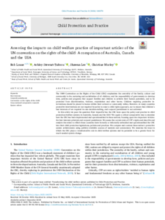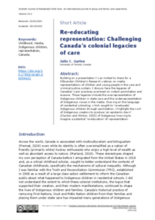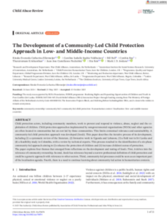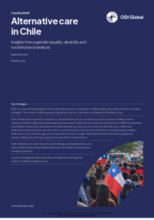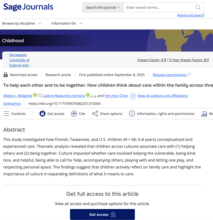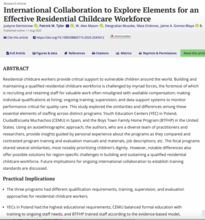This page contains documents and other resources related to children's care in the Americas. Browse resources by region, country, or category.
Displaying 1 - 10 of 1438
The 1989 Convention on the Rights of the Child (CRC) affirms the importance of family, culture, and community in children’s lives and obligates governments to support families and protect children from discrimination, violence, and exploitation, yet many countries still lack policies that require a child-rights approach, prioritize best interests in decision-making, or prohibit corporal punishment. This article critically examines how effectively Australia, Canada, and the United States have implemented key CRC principles—particularly best interests and corporal punishment—by comparing their child protection policies, legislation, and practices to assess the Convention’s influence and its potential to drive broader system reform.
This article presents a comparative analysis of the Czech Republic and Colombia’s implementation of the United Nations Guidelines for Alternative Family Care. Based on secondary data, it identifies a shared adherence to the UN framework; a strong Czech system for alternative caregivers’ selection, training and support; a deep ethical commitment of Colombian foster families to ensure children’s well-being, despite limited resources; and the relevance of supporting parents at risk of having their children removed from their care and integrating the effects of unplanned migration into alternative care strategies.
Building on a presentation invited for a Kilbrandon Children’s Research webinar on media representations of children and young people in the care and criminal justice system, this article discusses the legacies of Canadian ‘care’ practices premised on violent assimilation and erasure.
This paper outlines the development of a community-led child protection approach (Seeds), created through a multi-stage process involving a systematic literature review, formative research in Uganda and Lebanon, a field test in Sri Lanka, a feasibility study in Colombia, and expert review, resulting in a six-phase model designed to strengthen children’s protection and their sense of safety.
This brief analyses the state of alternative care for children in Chile, highlighting key statistics, sectoral findings and areas for policy improvement. It is part of a broader analysis of gender equality, disability and social inclusion (GEDSI) in Chile. The analysis draws on existing literature, government reports and key informant interviews (KIIs) with stakeholders working in this area.
This study investigated how Finnish, Taiwanese, and U.S. children conceptualized and experienced care.
This article examines how racial inequality shapes institutional care for adolescents in Brazil and highlights how racial literacy workshops exposed both gaps in practitioners’ understanding and systemic barriers to anti-racist practice. Despite these challenges, the intervention showed promising improvements, underscoring the urgent need to embed racial literacy in public social assistance policies and high-complexity care services to better protect Black adolescents.
This study compares residential childcare workforce practices across programs in Poland, Spain, and the United States, examining recruitment, training, supervision, and performance monitoring. Findings reveal both shared priorities, such as upholding children’s dignity, and region-specific differences that suggest potential solutions and highlight the value of international collaboration to strengthen training standards.
This study investigates how Kinship Navigator Programs (KNPs) help mitigate disparities in caregiving challenges faced by informal kinship caregivers (especially grandparents) of maltreated children. Using Latent Class Analysis, the research identifies three distinct patterns of caregiving challenges: financial, child's behavioral/emotional health, and intergenerational family dynamics.
The Adoptions and Safe Families Act (ASFA) of 1997, combined with rising incarceration rates, has increased the risk of parental rights termination for incarcerated parents, often leading to foster care placements for their children. A review of state-level policies found most lacked coordination between the child welfare and criminal legal systems, highlighting the need for cross-system collaboration and inclusion of parents with lived experience in legislative efforts.


